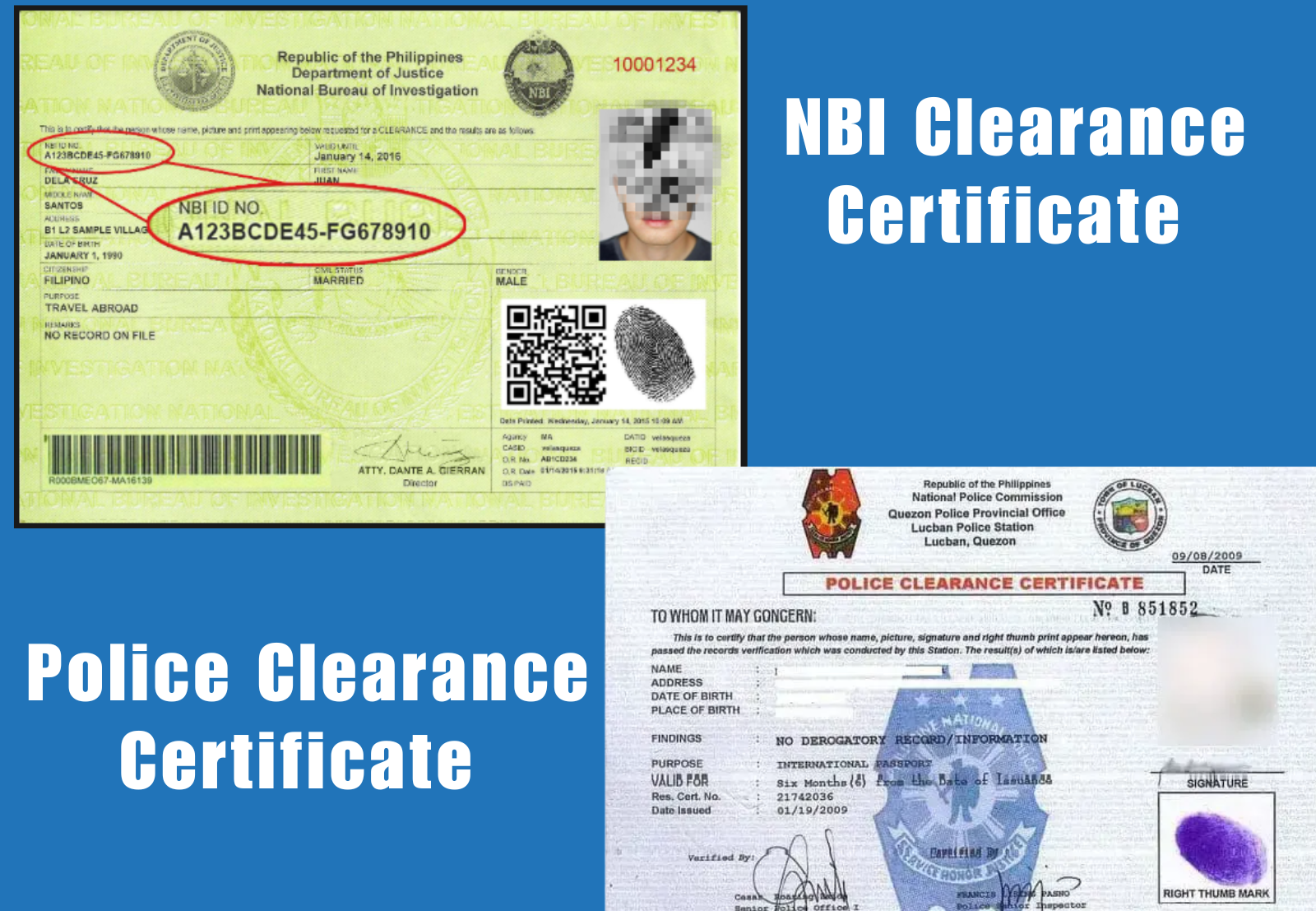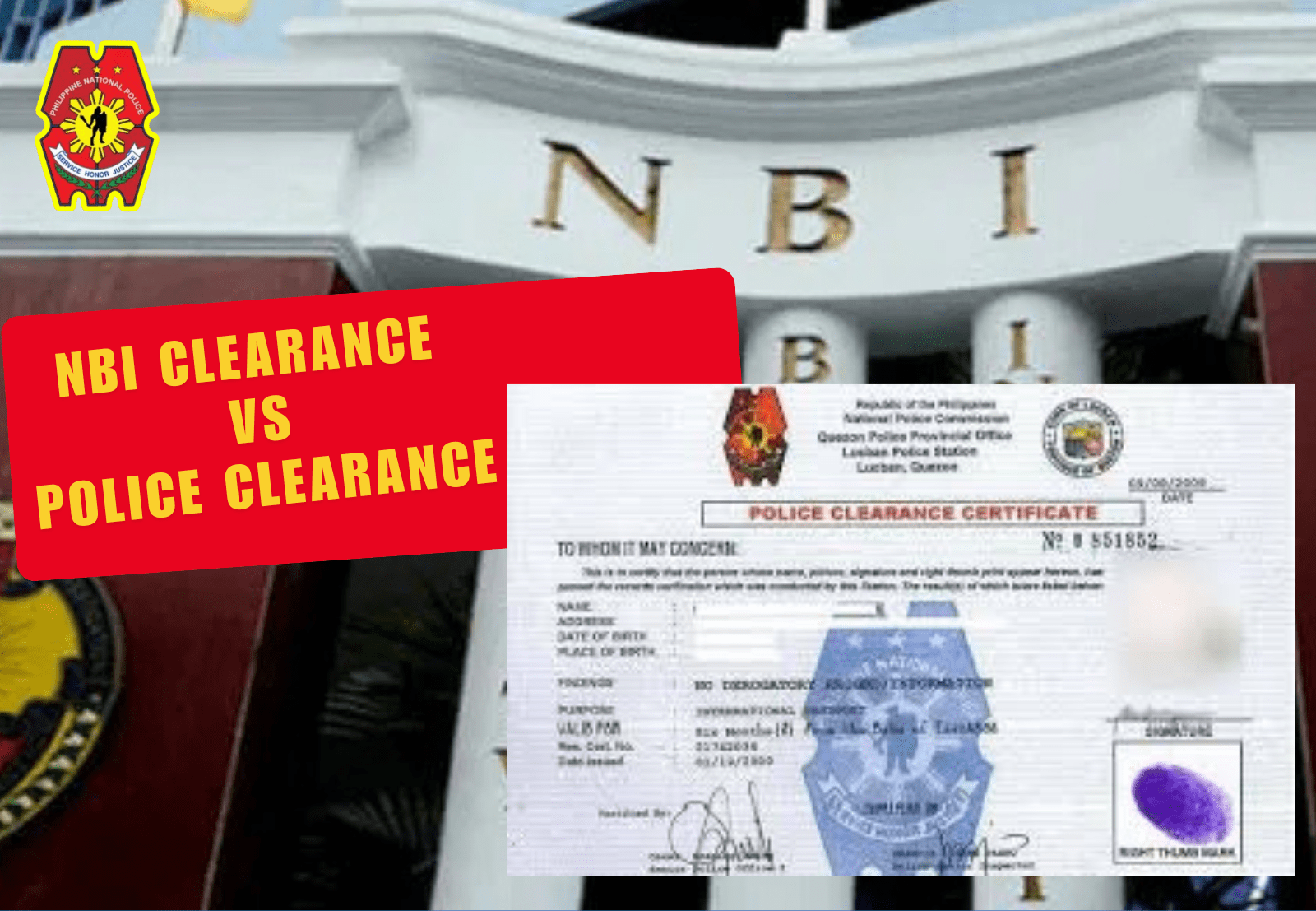If you’re applying for a job, passport, visa, or government document, you’ve probably heard of both NBI Clearance and Police Clearance. While they might seem similar, these two documents serve different purposes, and choosing the right one depends on where you’ll use it.
In this guide, we’ll walk you through the key differences between NBI Clearance and Police Clearance. What they’re for, who issues them, how the application process works, and which one is required for specific situations like overseas employment, local hiring, or ID applications.
Whether you’re a first-time job seeker, a student, or preparing for travel abroad, this article will help you understand exactly which clearance you need and why.
Understanding the Basics of NBI Clearance vs Police Clearance
Before we dive into the key differences, it’s important to understand what each clearance document is for, how it’s issued, and where it applies.
What Is NBI Clearance?
The National Bureau of Investigation issues an NBI Clearance and covers a person’s criminal records nationwide. It’s commonly required for immigration, passport applications, and employment abroad.
What Is Police Clearance?
Police Clearance is issued by the Philippine National Police (PNP) and checks for criminal records in your local area or city. It’s often used for local job applications, permits, and basic identity verification.
Key Differences Between NBI and Police Clearance
1. Issuing Agency
NBI Clearance: Issued by the National Bureau of Investigation, covering national-level records.
Police Clearance: Issued by the Philippine National Police (PNP) at your local police station.
2. Purpose
NBI Clearance: Required for abroad, immigration, passport, and national background checks.
Police Clearance: Often used for local job applications, permits, and basic identity verification.
3. Criminal Record Scope
NBI Clearance: Checks for records across all cities and provinces.
Police Clearance: Focuses only on your local area or city of residence.
4. Validity
NBI Clearance: Valid for 1 year from the date of issuance.
Police Clearance: Valid for 6 months, depending on the issuing station.
5. Online Application System
NBI Clearance: Apply via www.nbi.gov.ph
Police Clearance: Apply via pnpclearance.ph
6. Biometrics and Verification
NBI Clearance: Requires fingerprint, photo, and “identifying marks” entry
Police Clearance: Requires fingerprint and photo, with verification through QR code
7. Processing Time
NBI Clearance: May take 2–5 working days, especially with a “hit”
Police Clearance: Often issued the same day if there’s no pending record
Detailed Comparison: NBI Clearance vs Police Clearance
| Category | NBI Clearance | Police Clearance |
|---|---|---|
| Scope | National – covers records across the entire country | Local – limited to the issuing city or municipality |
| Issuing Agency | National Bureau of Investigation (NBI) | Philippine National Police (PNP) |
| Use Cases | Passport, immigration, visa, employment abroad | Local employment, permits, business registration |
| Validity | 1 year | 6 months |
| Renewal Option | Requires reapplication if expired | Must apply again; no direct renewal |
| Online Application | nbi.gov.ph | pnpclearance.ph |
| Biometric Process | Fingerprint, photo, and identifying marks | Fingerprint and photo with QR code verification |
| Dress Code | Avoid sleeveless tops, headwear, and colored contact lenses during biometrics. Wear decent attire for ID photo. | Follow standard modest dress. Sleeveless or revealing clothing may not be allowed during photo capture. |
Requirements for NBI vs Police Clearance
While both clearances require valid IDs and biometric capture, there are slight differences in the documents and steps you’ll need to prepare. Here’s a quick breakdown:
| Requirement | NBI Clearance | Police Clearance |
|---|---|---|
| Valid Government IDs | At least 1 valid ID (e.g., UMID, Passport, Driver’s License) | At least 2 valid IDs from the official list |
| Online Registration | Required via nbi.gov.ph | Required via pnpclearance.ph |
| Appointment Booking | Mandatory before visiting NBI Center | Mandatory for police station visit |
| Personal Appearance | Required for fingerprinting and photo | Required for fingerprinting and photo |
| Payment Confirmation | Official receipt or reference number from GCash, Bayad Center, etc. | Payment confirmation from GCash, Landbank, or in-person |
| Photo Requirements | Taken at NBI center during biometrics | Taken at police station during biometrics |
| Additional Notes | “First Time Jobseekers” may be eligible for fee exemption | Must be physically present at the selected police station |
Which One Should You Get Between NBI Clearance and Police Clearance
Depending on your goal, local employment, government processing, or travel abroad the right clearance to get can vary. Below is a clear explanation of when each document is most appropriate.

When to Use NBI Clearance
If you’re applying for work abroad, planning for immigration, or dealing with national-level agencies, the NBI Clearance is the better choice. It checks your criminal record nationwide in the Philippines and is widely accepted by foreign embassies, international employers, and government institutions.
For an NBI first-time job seeker, there’s a benefit too. Under the First Time Jobseekers Assistance Act, you may apply for an NBI Clearance without paying the fee, as long as you meet the basic requirements and present a barangay certificate.
When to Use Police Clearance
If you’re applying for a local job, starting a small business, or handling barangay-level documents, a Police Clearance is usually enough. Since it only covers your local area, it’s faster to process and is often released on the same day, perfect for walk-in job fairs or quick ID submissions.
It’s also commonly required when applying for barangay permits, civil service forms, or basic government IDs.
Application Process for NBI vs Police Clearance
Both NBI Clearance and Police Clearance require online registration, but they follow different steps and use different websites. Here’s how the application process works for each:
NBI Clearance Application Process
- o to the official NBI website: www.nbi.gov.ph
- Create an account or log in using your email
- Fill in your personal details and select the NBI clearance center nearest you
- Choose your NBI online appointment date and time
- Pay the NBI fee via GCash, 7-Eleven, or Bayad Center
- Visit the NBI clearance center on your appointment day
- Complete fingerprinting, photo capture, and identity verification
- If you get a “No Hit”, your clearance will be released the same day
Police Clearance Application Process
- Visit the official Police Clearance website: www.pnpclearance.ph
- Register a new account and provide accurate personal information
- Set an appointment at your preferred PNP station
- Pay the police clearance fee via Landbank, GCash, or in person
- Bring at least two valid IDs on your scheduled date
- Go through fingerprint scanning and photo capture at the police station
- Your clearance is usually printed and released on the same day, if no issues are found
What to Do If You Get a “Hit” on Your NBI or Police Clearance
Sometimes, when applying for either NBI Clearance or Police Clearance, your application may not be released right away. This usually happens if your name matches someone in the criminal database, a situation known as a “HIT.”
A “hit” doesn’t mean you have a criminal record. It just means your identity needs to be verified further before the clearance can be issued.
What Happens If You Have a NBI HIT
- A “hit” in the NBI system occurs when your name is flagged for further checking against nationwide criminal records.
- You’ll be asked to return after 5 to 10 working days, depending on the volume of pending verifications.
- On the day of your follow-up, bring your claim slip and a valid ID.
- If needed, NBI staff may conduct a brief interview or request additional documents to confirm that you are not the person involved in a case.
- Once cleared, your NBI Clearance will be printed and released at the same branch.
What Happens If You Have a Police Clearance HIT
- In most police stations, clearances are issued on the same day, but a “hit” may occur if your name matches someone in the local police blotter or database.
- The station may put your clearance on hold for background verification.
- Some applicants are asked to return after a few days, especially if the verification process requires coordination with barangay officials or other agencies.
- You may be asked to present additional valid IDs or supporting documents to confirm your identity.
- Once cleared, your Police Clearance can be claimed in person at the station.
Conclusion:
NBI Clearance vs Police Clearance comes down to purpose and coverage. If you’re applying for local jobs, permits, or basic ID requirements, a Police Clearance is often enough. But for travel, immigration, and employment abroad, an NBI Clearance is the preferred and more widely accepted document. Make sure to choose the right one for your needs, and, if required, prepare for both. Knowing the difference between NBI Clearance and Police Clearance can save you time, money, and unnecessary delays.
FAQs – NBI Clearance vs Police Clearance
1. How much is NBI Clearance?
As of 2025, the standard NBI Clearance fee is ₱130, plus a ₱25 system fee when paid via online channels such as GCash or 7-Eleven. The total cost is usually ₱155, but it may vary slightly depending on your payment method.
2. How to pay NBI online using GCash?
After setting your NBI appointment on the official website, choose GCash as your payment option. You’ll receive a reference number. Open your GCash app, go to “Pay Bills”, tap “Government”, then select “NBI”. Enter the reference number and the exact amount shown. Once paid, you’ll get a confirmation. Keep the receipt or screenshot for your appointment day.
3. Do NBI and Police Clearance have the same validity period?
No. NBI Clearance is valid for one year from the date of issuance, while Police Clearance is usually valid for six months, depending on the local PNP station. Once expired, both documents must be re-applied for; there is no extension or renewal option.
4. Can I apply for both NBI and Police Clearance online?
Yes, both clearances can be applied for online. NBI Clearance applications are done through nbi.gov.ph, while Police Clearance is processed through pnpclearance.ph. Both systems require online registration, appointment booking, and payment before going to your chosen center or police station.
5. Is Police Clearance and NBI Clearance the same?
No, Police Clearance and NBI Clearance are not the same. Different agencies issue them and serve various purposes. Police Clearance is issued by the Philippine National Police (PNP) and covers only your local records. In contrast, NBI Clearance is issued by the National Bureau of Investigation and provides a nationwide check of your criminal record.


This Post Has 8 Comments
Hello, you used to write great, but the last few posts have been kinda boring?K I miss your great writings. Past few posts are just a bit out of track! come on!
Thank you
F*ckin’ remarkable things here. I’m very glad to see your article. Thanks a lot and i am looking forward to contact you. Will you kindly drop me a e-mail?
Thanks a lot for sharing this with all of us you really recognize what you are talking approximately! Bookmarked. Please also discuss with my site =). We will have a hyperlink exchange contract between us!
Would you be desirous about exchanging hyperlinks?
No currently we are not accepting.
Greetings! Very helpful advice on this article! It is the little changes that make the biggest changes. Thanks a lot for sharing!
Hey just wanted to give you a brief heads up and let you know a few of the pictures aren’t loading properly. I’m not sure why but I think its a linking issue. I’ve tried it in two different internet browsers and both show the same results.